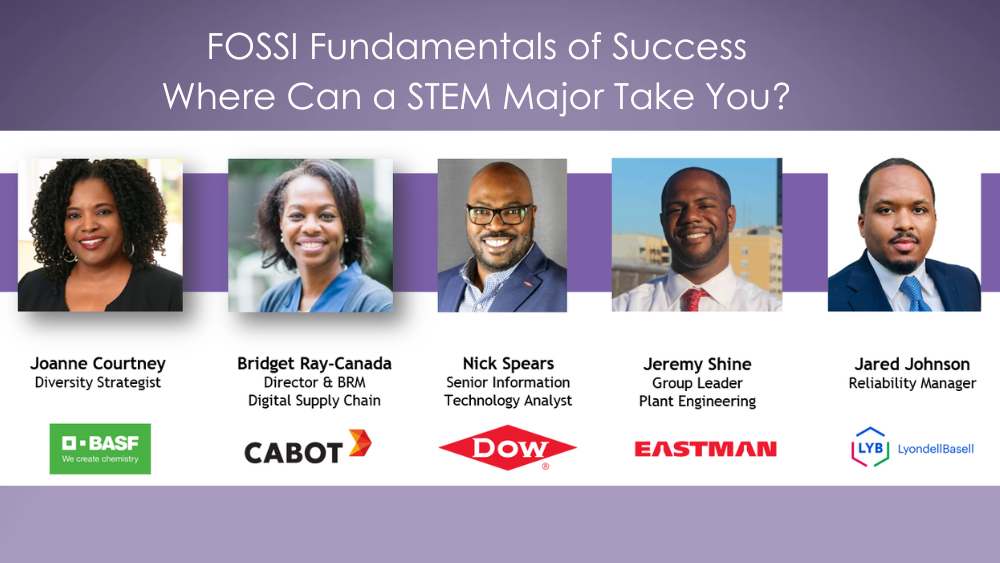In the latest offering from the Fundamentals of Success program Where Can a STEM Major Take You?, FOSSI partners spoke with scholars about their career paths and what they’ve learned. Joanne Courtney, Diversity Strategist at BASF led the discussion with panelists Bridget Ray-Canada, Director and BRM, Digital Supply Chain at Cabot; Nick Spears, Senior Information Technology Analyst at Dow; Jeremy Shine, Group Leader, Plant Engineering at Eastman; and Jared Johnson, Reliability Manager at LyondellBasell.
The panelists discuss their career journeys
Nick Spears had a variety of jobs before a mentor suggested tech. “I have what I call career ADHD. I see something and want to do it right now. When you work at a larger company with a huge breadth of services across different environments, it’s easy to do that. But if you told me 10 years ago that I would be implementing AI across seven different functions, I would not have believed it. He continued, “I love tech and IT because it’s constantly changing and there is tremendous opportunity for growth.”
Jeremy Shine studied mechanical engineering in college and began as an engineer supporting manufacturing small cap projects before moving on to larger projects and mechanical design. He also worked on two circular economy projects before assuming his current role as a group leader. Although he has been at Eastman for 8 years, he says “It is still early in my career and there is so much more to learn and lots of different avenues I can pursue, which is exciting.”
Jared Johnson majored in electrical engineering and got his first job as a network engineer for a cybersecurity company. While he enjoyed IT, he needed a more dynamic environment. “In your career it’s important to learn what you don’t like,” he told scholars. Having grown up near the LyondellBassel (LYB) Channelview facility, he researched the petrochemical industry, landed a job at LYB as an instrument and electrical engineer, and later took a team lead role, which confirmed for him that he wanted to be in leadership.
An industrial engineering major, Bridget Ray-Canada advised scholars to “really think about what you like to do, what drives you, and what makes you happy. I like to connect with people. I’m detailed oriented and process interests me, so industrial engineering was a good fit. However, just because you major in something doesn’t mean have to do it for the rest of your life. I’m an IE but I have done many different jobs and can learn how to do just about anything.”
Johnson noted, “We all have input from family and friends telling us what to do with our lives. However, you won’t truly succeed until you want it for yourself. Do a deep dive about what you enjoy personally and start looking at that end goal. College is a point in your journey, not the destination. Engineering degrees are not easy, and I could have had a more fun life balance in college, but what motivated me was the life and career it would provide me after school.”
Ray-Canada concurred, advising, “Have that mindset of curiosity. When you’re not curious you’re not learning or growing.” Johnson added, “Once you get out in the world, it’s very important to have strong written and verbal skills. Being able to give presentations, answer questions and knowing how to tailor the information to what people need is key to your success.”
Spears underscored the significance of company culture, cautioning scholars, “At a certain point, a company may pay more because the environment is toxic; that’s a weight you can’t shake off. A great company culture can carry you through tough times because you know they recognize and value you, and you know how you fit into the larger picture.”
Panelists share last words of advice
Panelists all agreed that good mentors and learning how to work in a team are critical.
As the discussion wrapped up, Courtney asked the panelists to offer one last piece of advice to scholars.
“Whether you want to or not, you have a brand,” said Johnson. “Everything you do, every way that you show up, every commitment you make contributes to your brand. Me showing up late or early, me giving it a mediocre effort or giving it a great effort is going to connect with the way people see me.”
Shine shared, “Someone early on told me to ‘bloom where you’re planted.’ When I take a new role, I want to master it and come back tomorrow better than today. When you start really digging in and performing well, the opportunities open up and it gives you the ability to really drive your career.”
“Don’t have a rigid path,” counseled Spears. “Your career is not always a straight line and the twists and turns can enrich your experience. Be flexible and open to trying different things.”
Ray-Canada had the last word, encouraging scholars to “show your initiative and drive, don’t be shy and sit back. Know where you want to go. Closed mouths do not get fed.”
We invite companies not currently supporting FOSSI to build their pipeline of outstanding and diverse talent by supporting a FOSSI scholar. Learn more.

